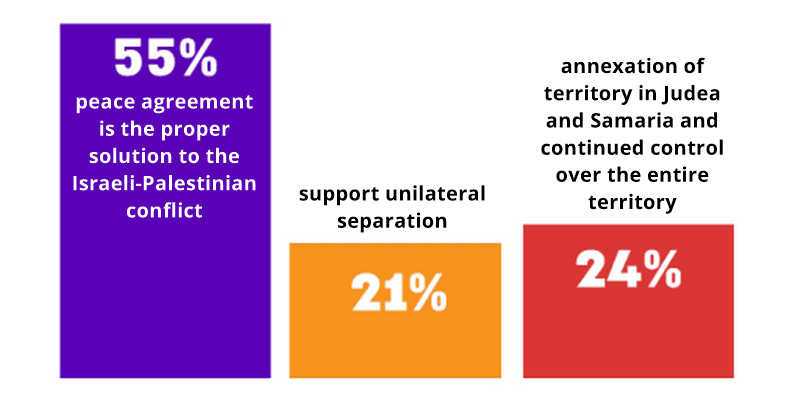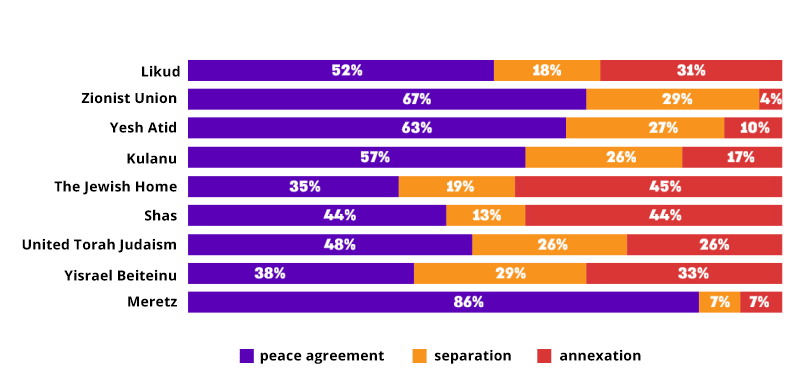![]()
Tal Shalev | Walla | February 13, 2018
Recent right wing efforts to apply establish Israeli sovereignty on the West Bank have sparked a political storm. A new survey, however, shows that only 24% of the Jewish public believe annexation of territory in Judea and Samaria and continued control over the entire territory should be Israel’s political objective at this time; 55% think a peace agreement is the proper solution to the Israeli-Palestinian conflict and 21% support unilateral separation. Prime Minister Netanyahu got into an awkward political row with the White House yesterday (Monday) after telling members of the Likud Central Committee that he was discussing the establishment of Israeli sovereignty with the US administration. The study reveals that even in his own party, most members support a final status agreement with the Palestinians while less than a third prefer annexation: 52% of Likud members favor a peace agreement, 31% annexation, and 18% unilateral separation.

The study, commissioned by Commanders for Israel’s Security and carried out by Panel Project Sample, surveyed 602 Jewish voters. It avoided using familiar and politically charged phrases such as “two states,” “disengagement,” “annexation” or “establishing sovereignty.” Instead, it asked respondents “what do you consider the right political objective at this time,” and outlined three options. First: a final status agreement with the Palestinians including an agreed upon border, in which Israel is on one side of the line and a demilitarized Palestinian state on the other; Second: civilian separation from the Palestinians and withdrawal of isolated settlements combined with an ongoing Israeli military presence in the area until a peace agreement is reached; Third, Israeli control over all the territory so that Israelis and Palestinians live side by side in Judea and Samaria – in other words, Israeli sovereignty.
The agenda of the governing coalition still includes a proposed law to establish Israeli sovereignty over the Jewish population of Judea and Samaria. Consideration of the bill, sponsored by Yoav Kisch (Likud) and Betsalel Smotrich (Jewish Home) was postponed earlier this week at the request of Prime Minister Netanyahu, but the survey suggests that within coalition parties most people do not support annexation.
A breakdown of responses by party affiliation shows that even a majority of Jewish Home Party voters do not consider annexation to be the desired political objective. Only 44% said they supported ongoing civilian control, while 35% preferred a final status agreement and 19% favored separation. In the Yisrael Beitenu Party, 33% chose annexation as the preferred option, while 38% supported an agreement and 29% favored separation. Of all coalition parties, support for continued civilian control was lowest in Kulanu. Only 17% of respondents from that party supported it, while 57% favored a final status agreement and 26% chose unilateral separation.
The ultra-Orthodox parties, Shas and Torah Judaism, are split. While only 26% of Torah Judaism voters think annexation is the preferred political option, 44% of Shas voters do, just like members of the Jewish Home Party. 48% of Torah Judaism members favored a peace agreement and 26% separation. The figures for Shas were 44% and 13%, respectively. In the opposition parties, an overwhelming majority supports a final status agreement: 67% of Zionist Camp voters, 63% of Yesh Atid voters, and 86% of Meretz voters. A very small percentage support full, continued Israeli control over the entire territory: 4% of Zionist Camp voters, 10% in Yesh Atid and 7% in Meretz. Since the survey was limited to Jewish voters it did not measure the views of Joint List supporters.
The chair of the organization that commissioned the survey: annexation is pushing Israel down a slippery slope:
Commanders for Israel’s Security is a non-partisan movement consisting of 250 former, senior officers in the IDF, the Israel Security Agency, the Mossad and the Israel Police. The movement develops political and security initiatives. Commanders for Israel’s Security vehemently opposes annexation and the establishment of Israeli sovereignty on the West Bank, and believes that Israel must preserve conditions for a security-political agreement in the future. Last year, a controversial campaign sponsored by the movement provoked a furor with billboards showing crowds of Palestinians accompanied by Arabic language headlines proclaiming “we will soon be the majority.”
The chair of Commanders for Israel’s Security, Major Gen. (ret.) Amnon Reshef, told Walla!News “the annexation bill is a dangerous law that is pushing Israel down the slippery slope leading to a binational state and the end of the Zionist dream. The proposed law is only 62 words long. 62 words that threaten to completely change the way we live, and bring the Zionist vision to an end. 62 words that fail to seriously weigh the implications of annexation on Israel’s economy, national security or strategic interests.”
According to Reshef, “you cannot hold an amateurish discussion on an issue of such dramatic significance. We must have a serious debate and consider the very real and dangerous implications of annexation. These 62 words carry with them 2.7 million Palestinians. The Israeli government must make the responsible decision to take the issue of annexation off the agenda and set aside this populist and irresponsible legislation.”

